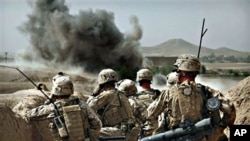During the second day of the North Atlantic Treaty Organization, or NATO, Summit in Lisbon, NATO Allies and International Security Assistance Force, or ISAF partners agreed that the process of transition to full Afghan security responsibility and leadership in some provinces and districts is on track to begin in early 2011. The gradual, conditions-based transition of security responsibility to the Afghan National Security Forces will be complete by the end of 2014.
During the Summit, NATO Secretary General Anders Fogh Rasmussen and Afghan President Hamid Karzai signed a Declaration on an Enduring Partnership that expressed Allies’ long-term commitment to Afghanistan’s security and stability. As the transition process unfolds and once Afghanistan’s security forces take over responsibility for security, NATO will continue to provide critical support.
The transition process is part of Afghanistan’s progress on its path toward becoming a self-reliant, independent member of the community of sovereign nations. For the better part of a decade, Afghans have worked toward this goal. And as far as Afghanistan's President Karzai is concerned, his country is ready to take the next step.
The transition process is possible due to a significant improvement in conditions on the ground, including the growth and increased capabilities of the Afghan National Security Forces, said U.S. President Barack Obama:
"The whole point of ramping up our troop presence was not because we wanted to maintain a long-term, large presence in Afghanistan, but it was to immediately blunt the momentum that we were seeing from the Taliban -- and to create the space for the training of effective Afghan security forces.
"And on both those fronts I think the objective assessment is, is that we have made progress. You have fewer areas of Afghanistan under Taliban control. You have the Taliban on the defensive in a number of areas that were their strongholds. We have met or exceeded our targets in terms of recruitment of Afghan security forces. And our assessments are that the performance of Afghan security forces has improved significantly."
By the end of 2014, Afghans will be in the lead, and it is a goal to make sure that we are not still engaged in combat operations, said President Obama. "Certainly our footprint will have been significantly reduced.
"If the enemies of Afghanistan have the idea that they can just wait it out until we leave, they have the wrong idea," he said. "We will stay as long as it takes to finish our job."
Preparing For Change In Afghanistan

Gradual, conditions-based transition of security responsibility to the Afghan National Security Forces will be complete by the end of 2014.



